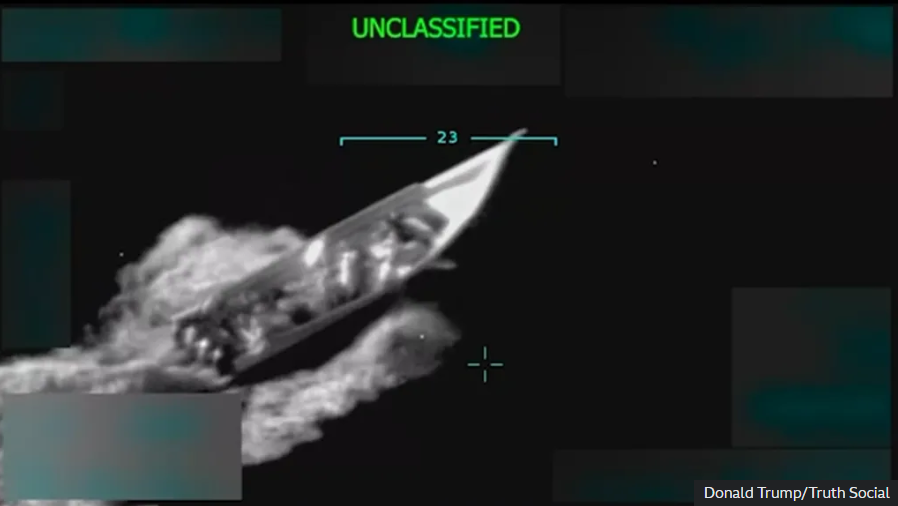
VANGUARD - Expressing the viewpoint of the Communist Party of Australia (Marxist-Leninist)
For National Independence and Socialism • www.cpaml.org
Above: screenshot from Trump's social media
The US concept of the rule of law has not developed all that far since “shoot first, ask questions later” became an accepted practice.
According to etymologists (those study the origins of words and phrases) it first became fashionable back in the 1880s.
Nearly a century and a half later, Donald Trump is still applying the maxim as he seeks to get his way towards Venezuela’s rich oil deposits.
He has illegally attacked vessels in Venezuelan and international waters, arguing, without proof, that the boats were carrying drugs into the US.
In September, he relished showing the world a video of a direct strike on a vessel in which 11 people were killed. There have since been other attacks, including on a Colombian vessel. Al Jazeera says: “The US has carried out at least six strikes on boats in Venezuelan waters since the start of September, killing some 27 people, after allegations that they were carrying narcotics.”
Drug cartels do indeed send narcotics from some South American countries to the US. But one of the worst and most damaging drug cartels was home-born.
Purdue Pharma was the manufacturer of the opioid Oxycontin to which millions of Americans became addicted. These corporate criminals knowingly fostered dependency on their product. The TV mini-series Dopesick needs to be watched to understand the criminality inherent in corporate profit-seeking.
Trump’s attempted criminalisation of President Maduro follows the playbook of President H. W. Bush who in 1998, accused Panamanian dictator Manuel Noriega, of running drugs into the US. Despite Noriega’s longstanding ties to United States intelligence agencies, it was feared in US circles that he threatened the neutrality of the Panama Canal, and the U.S. claimed it had the right under the treaties to intervene militarily to protect the canal.
Venezuela has long been threatened by US imperialism. Venezuela has the largest oil reserves in the world and significant deposits of gold, iron, diamonds, copper, bauxite and many other minerals, making the country one of the richest in the world in terms of natural resources.
US imperialism is determined to secure access to Venezuelan natural resources in the face of competition from Russia and China.
Rosneft, Russia’s state-controlled oil company, has been heavily involved in Venezuela’s oil industry, partnering with PDVSA (Petróleos de Venezuela S.A.) in multiple joint ventures. Russia has extended billions of dollars in loans to Venezuela, many of which are backed by oil guarantees. These arrangements give Russian firms direct stakes or rights in Venezuelan oil output.
Venezuela has been a major supplier of crude oil to China, particularly through long-term oil-for-loan agreements signed in the 2000s and 2010s. The China Development Bank and China Exim Bank lent Venezuela over $60 billion since 2007, with repayment largely made in oil shipments. In Addition to oil, China has shown interest in Venezuela’s gold, bauxite, coltan, and rare earth minerals—resources crucial for electronics and green technologies.
The defence of Venezuela's sovereignty will be strengthened by its new-found relationship with neighbouring Colombia which shares its opposition to US encroachment on the region. Involvement of the people of both countries in preparation for defence against US invasion is necessary.
While the current major task is to defeat the ongoing threats of aggression by US imperialism in the Caribbean seas, there must be the realisation that there is no “good” imperialism, and that Russian and Chinese imperialisms must also be guarded against.